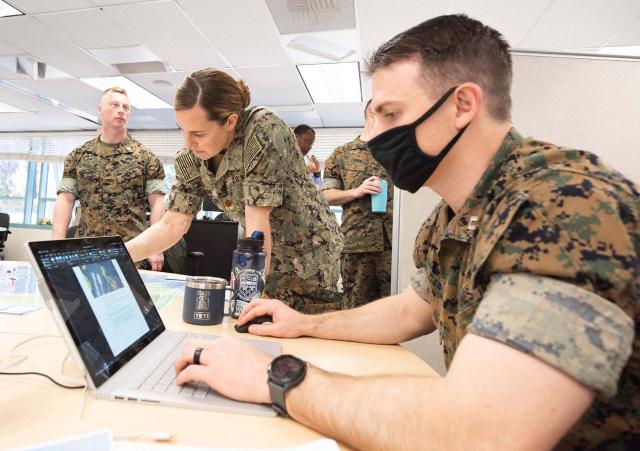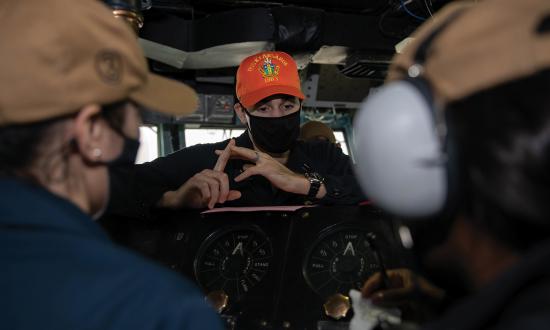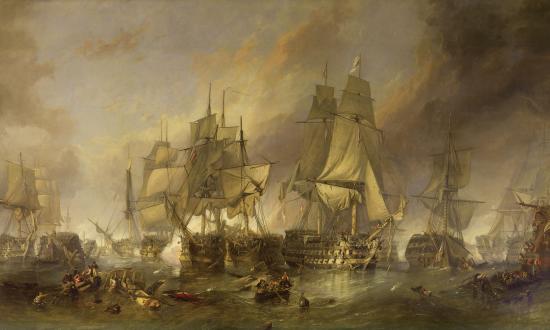Empathy—especially in military circles—is often misunderstood and maligned. Many leaders dismiss the idea because they associate the concept with being soft, overly compassionate, or nice. These connotations prevent leaders from seeing empathy’s true value. Leadership is a people business. Empathy is the critical people skill that ensures businesses thrive. It enables and enhances the ability to understand, inspire, motivate, and communicate.
Leaders often conflate empathy with sympathy. Assuming another shares our own thoughts, understanding, and feelings about their own situation is sympathy, not empathy. Sympathy has to do with sharing emotions but is still focused on the individual who is sympathizing, rather than truly seeking to understand another’s perspective. To empathize—to fully understand an individual’s perspective that drives not just what they feel but how they think—requires understanding and development.
Developing empathy is much easier said than done. Carl von Clausewitz recognized the difficulty of fully seeing from other people’s perspectives when he wrote that “senses make a more vivid impression on the mind than systematic thought.”1 It is a process of understanding not only an individual’s bare emotions or cold calculus, but also the interplay of these. Thus, the ability to see, feel, and understand another’s perspective is not intuitive; rather, it is a skill that must be developed.
Empathy development is arrested because too many leaders malign empathy as only being emotionally attuned to others. Psychologists and researchers, however, describe the important differences between emotional and cognitive empathy. Emotional empathy is the ability to deal with the way others feel. Cognitive empathy, on the other hand, is deciphering the way people think.2
Real empathy requires informed imagination. To step into someone else’s shoes, leaders must seek to be informed by understanding the historical, cultural, and lived context of a person’s experience. Through these lenses, they can use their imaginations to see what others see and feel what others feel. Good leaders must stretch across the emotional and cognitive domains, incorporating both feeling and thinking. Both domains are required because, while it might seem like people make good decisions based on logic alone—looking at the facts and weighing the pros and cons of a situation—this is not the way humans behave. Logic often is changed by emotions and biases. Straining our imagination gives us a glimpse, however imperfect, into diverse and unique perspectives.
This type of empathy can be applied to solve the most complex problems. It allows leaders to broaden their understanding, expand their options, and increase the quality of their decisions. It is particularly important as today’s Navy leaders are challenged to: 1) lead naval units in a complex environment; 2) integrate fully with the joint team; and 3) plan effectively against the nation’s potential foes.
Overcoming Complexity
Empathy is key to leading through the complexity of the current strategic environment, where countless variables interact in unpredictable ways, making outcomes difficult to predict. Advancing technology, globalization, and social media act as amplifiers of this complexity, connecting systems in new and novel ways. At the same time, the U.S. Navy operates in multiple domains in simultaneous operations around the globe and in space. There is no place where an enemy might act that does not affect the Navy in some way.
The challenge this poses for Navy leaders is that they are facing infinite possibilities. Without empathy, a leader is armed only with the finite knowledge and ideas that are stored and generated within his or her own mind. Empathy, however, blows the lid off of this limiting factor. It allows leaders to open their own minds to see and understand the perspectives of others.
The Navy’s focus on increasing diversity and inclusivity, for instance, would be for naught if leaders were not willing to listen to their shipmates. It follows that when a leader has a team with diversity of thought and they are able to empathize effectively, they broaden their own aperture and take in other possibilities. The facts and data may not change, but leaders can change the way they perceive them. If leaders strain to think outside the box, they may be able to come up with other ways to see a situation or solve a problem. Empathy ultimately enables leaders to match the complexity of the environment with the broadened perspective of open minds.
Breaking Down Barriers
Empathy also is important for Navy leaders to break down barriers that block their teams from fully integrating into the joint environment. Despite the legal and political movements that have forced jointness, there are still several challenges to operating as a joint force. Services generally are built around their domains, be it air, land, or sea. They have their own histories and origin stories and have developed their own cultures. Over time, the institutions develop a corporate set of beliefs or perspectives to which most of its members ascribe.3 Services even maintain their own lexicons, theories of warfare, strategies, and doctrines. These differences can create problems in communication and interoperability.
If this is a complex problem for the services in general, it is even more so for the Navy. Unlike the Army and Air Force, the Navy operates in multiple domains and has thus developed communities that specialize in each of them. With primary titles such as naval aviator, surface warfare officer, and submariner, the Navy has promoted a sense of tribalism. In some ways this allows a sense of esprit de corps and pride in one’s job. When it advances to the level of parochialism, however, tribalism can be detrimental. A recent article published on The Strategy Bridge looked at past issues with “non-communicating fiefdoms” in the Navy and then asserted that “it seems like nothing has changed over the past two decades.”4
Embracing empathy will allow the Navy to break down these barriers, first within the service and then within the joint team. Just understanding the capabilities of other communities and services is not enough; that understanding is colored with the bias of the leader’s own perspective. The other communities and services understand their capabilities through their own lenses, and it is important that Navy leaders try to see these unique perspective as well. Empathy adds objectivity and enables them to encounter new ideas, possibilities, and options, increasing leaders’ ability to effectively integrate into the joint force.
Knowing One’s Enemies
Though it is not intuitive, empathizing with the nation’s potential foes also is imperative. In an era in which technology is advancing rapidly, it is easy to focus on capabilities. Since the end of the Cold War, the United States has had a decisive competitive advantage in capabilities, but China is rapidly closing the gap. This makes it easier to focus on technical information and to view the threat through capabilities. But just as important as capabilities (what they can do) is intent (what they want to do). This leads to some important questions: What is the enemy thinking? What are they planning to do? What motivates them?
Developing empathy deepens the meaning of Sun Tzu’s sage advice to “know the enemy.”5 It may seem relatively easy to understand how the leaders of another nation think, but rational actors do not always use the same criteria for rationality. The United States cannot afford to assume another state will act as the United States would in any given situation. The CIA’s website advises to be wary of “mirror-imaging” because it:
leads to dangerous assumptions, because people in other cultures do not think the way we do. . . . The U.S. perspective on what is in another country’s national interest is usually irrelevant. . . . judgment must be based on how the other country perceives its national interest.6
It is easy to imagine that other countries think as the United States does. U.S. policymakers, for example, could easily assume that China’s buildup of missile defenses and increased size and capabilities of its blue-water navy parallel U.S. motivations for strengthening these capabilities. This intuition, however, is limited in perspective and likely overlooks critical nuances that can be gained only by taking the Chinese perspective.
Empathy can provide valuable insight, but this informed imagination is much more difficult to acquire than mirror-imaging. It does not come naturally and is made difficult by language, culture, history, and religious barriers. Leaders must not be satisfied with substituting their own views for that of others. Rather, they must seek information and be willing to mentally walk in the shoes of their foes as best they can. This is particularly true of Navy leaders, who have the greatest potential for interaction with potential U.S. foes as the threat picture migrates from land-centric operations in the Middle East to sea-centric operations in the Pacific. Empathy can enable the Navy to see not only what competitors are capable of, but also what they intend to do.7
Practicing Advanced Empathy
Empathy is a skill, and like most skills, it comes more naturally for some than for others. Empathy requires training and practice to become proficient. The Naval War College offers an elective that teaches the concept of “perspective-taking” and then reinforces the concepts with training.
War College students are exposed to a case study each week that is purposefully controversial, one in which they are likely to have a bias toward one side of a case or the other. Students are then asked to answer a poignant question from the perspective of three different people or organizations from the case. At first, the students tend to analyze and describe the views from their own perspectives, but through weekly training, they are able to effectively articulate the case from the perspective of each entity.8
The CIA encourages this type of perspective-taking, or “role-playing,” reinforcing that it is only “living the role that breaks an analyst’s normal mental set and permits him or her to relate facts and ideas to each other in ways that differ from habitual patterns.”9 Actors and actresses use it as well in a technique called “method acting,” in which they take on and live within the persona of the character they are portraying to get a better idea of how they would behave.10 In these cases, it comes down to study and practice.
Developing empathy is not limited to school settings. Opportunities are available everywhere. News stations and even printed news present perspectives on real-world events all the time. We often gravitate toward those sources of news that most align with our own viewpoints, but we can challenge ourselves by watching, listening, or reading the other side of the story. Exercising this empathy may be uncomfortable at first, but it develops the skills that will make it easier to see and even harness opposing views. Initially, it will increase leaders’ emotional intelligence, allowing them to identify with members of their teams, understand how they feel, and communicate with them in a meaningful way. Developing advanced empathy skills will enable Navy leaders to thrive in complexity, integrate fully into the joint environment, and plan more effectively to defeat the nation’s foes.
1. Carl von Clausewitz, On War, trans. and ed. Michael Howard and Peter Paret (Princeton, NJ: Princeton University Press, 1976), 117.
2. “Types of Empathy,” Skills You Need, 22 December 2019.
3. Carl H. Builder, The Masks of War: American Military Styles in Strategy and Analysis (Baltimore: RAND Corp, 1989), 8.
4. Wes Hammond, “Distributed Lethality and the Failure to Break Naval Stovepipes,” The Strategy Bridge, 28 April 2017.
5. Sun Tzu, The Art of War, trans. Lionel Giles (The Project Gutenberg eBook, 2005), III, 18.
6. Richards J. Heuer Jr., “Psychology of Intelligence Analysis,” Central Intelligence Agency, 16 March 2007.
7. Nicole L. Freiner, “What China’s RIMPAC Exclusion Means for U.S. Allies,” The Diplomat, 26 May 2018; Ben Werner, “China’s Atypical Response to U.S. Navy FONOPS May Be a Message to Trump Administration,” USNI News, 3 October 2018.
8. The perspective-taking course described is designed and taught by Dr. Olenda Johnson, a professor at the Naval War College and architect of the Navy’s two-star and Senior Executive Service leadership course.
9. Heuer, “Psychology of Intelligence Analysis.”
10. Alyssa Maio, “How the Best Method Actors Prepare for their Roles,” Studiobinder.com, 31 July 2019.







